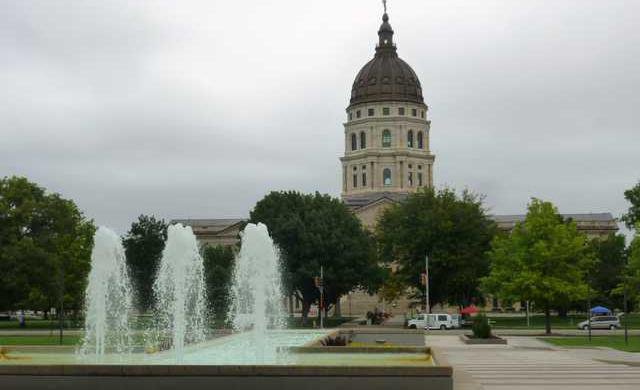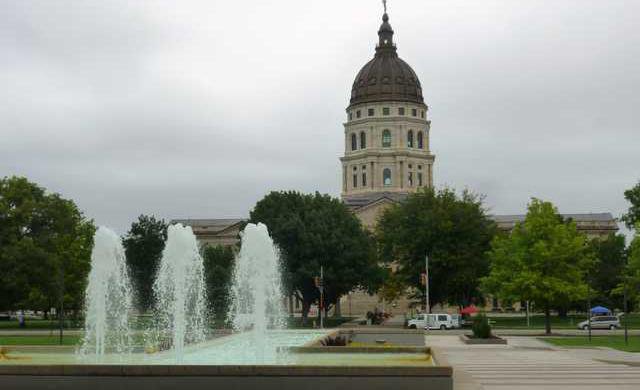TOPEKA — Kansas Supreme Court justices on Wednesday heard oral arguments in appeals to Adam Longoria’s capital murder conviction. No decisions were made as the case was taken under advisement.
Longoria, now 40 years old, is serving a life sentence with no parole for the murder of 14-year-old Alicia DeBolt of Great Bend.
The teenager disappeared the night of Aug. 21, 2010, just days before she was to start classes at Great Bend High School. Her charred remains were found three days later at an asphalt plant near Dundee where Longoria had worked. Longoria was also found guilty of criminal sodomy, aggravated criminal sodomy, attempted rape and vehicular burglary and theft in his jury trial.
Although he was convicted of capital murder, the state did not seek the death penalty.
The oral arguments were presented before the entire Supreme Court, which consists of seven justices.
Speaking for the defense on Wednesday, Reid T. Nelson from the Capital Appeals and Conflicts Office in Topeka argued that the evidence was not sufficient to support capital murder, which was based on the determination that Longoria had sexually molested the girl before her death.
“There’s a great amount of speculation and not much evidence,” Nelson argued.
Likewise, he said the jury should have been given the option of finding Longoria guilty of unintentional second degree murder caused by an extreme disregard for Miss DeBolt’s life. This was based on the fact that tape was used to restrain her. The coroner reported her cause of death was strangulation or some other cause of asphyxiation, Nelson said.
He also argued that the trial should have been moved from Barton County. A change of venue was requested after a survey showed virtually 100 percent of the county’s population was aware of the case and had opinions on it. However, when asked if a survey was done in another county for comparison, Nelson said, “no.”
Kristafer R. Ailslieger, Assistant Solicitor General, represented the state Wednesday, answering questions about how the Kansas Attorney General’s Office handled the prosecution. The justices’ first question for Ailslieger was how a photo of Alicia DeBolt as she appeared before her murder was introduced as evidence. The defense has argued the photo was not necessary and could have prejudiced the jury.
Ailslieger said his understanding was that the prosecution thought the photo might be needed with some witnesses for identification purposes. It was not, but since it was introduced as evidence it did go to the jury.
“The defense could have moved to strike the photograph,” he said. “I think it’s harmless.”
Justices also asked Ailslieger to address the quality of proof in regard to the capital murder conviction. He agreed that evidence of a sexual attack on Miss DeBolt was circumstantial, but said the state had proved its case.
“You have evidence of premeditation and intent,” he said, reminding the justices of texts sent to the girl’s cell phone. “I think you connect the dots.”
That is also true of evidence that Miss DeBolt’s death was intentional. “I don’t see any evidence of recklessness,” he said. “We know she died and it wasn’t of natural causes. (Longoria) asked people to lie for him and make up an alibi.” And, when it became clear that he would be arrested, Longoria stole a truck and attempted to flee, Ailslieger continued.
“We know Adam Longoria killed her,” he concluded. Only Adam Longoira knows exactly how it happened but, Ailslieger said; “The jury just drew reasonable inferences, just as we all would.”
On the change of venue decision, Ailslieger told the justices, “I think it’s a matter of principle,” to have the trial in the community where the crime occurred. He was reminded that it is also a matter of principle for a suspect to receive a fair trial.
“The jurors were all impartial,” he said. They were questioned during jury selection. The prosecution also claimed Longoria could hardly complain about not getting a fair trial in Barton County after he “sought out media publicity.”
No time frame was given for when the Supreme Court will rule on the appeals. Justices also heard appeals in two other court cases and in two disciplinary actions involving attorneys.
Supreme Court hears Longoria appeals





